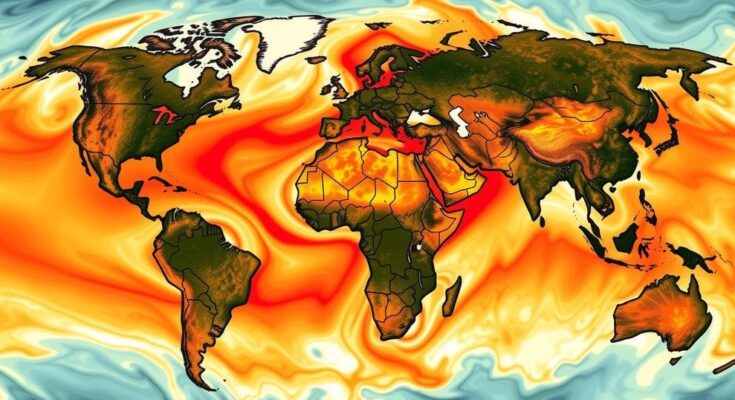In 2024, the world experienced its first full year with average temperatures exceeding 1.5 degrees Celsius above pre-industrial levels, according to the Copernicus Climate Change Service. This milestone indicates a concerning trend in climate change, as every month recorded was exceptionally warm. Urgent measures to reduce greenhouse gas emissions are essential to avert further increases in global temperatures and associated climate disasters.
The year 2024 has been officially recognized as the first year in which global temperatures surpassed the critical threshold of 1.5 degrees Celsius above pre-industrial levels, as reported by the European Union’s Copernicus Climate Change Service (C3S) on January 10. This significant milestone indicates a concerning trend in climate change, as temperatures continued to rise across the globe, with each month of 2024 recorded as either the warmest or second-warmest for that particular month since records began. The average temperature for the planet in 2024 was found to be 1.6 degrees Celsius higher than during the pre-industrial period of 1850-1900.
The implications of reaching this temperature have raised alarms among scientists and climate advocates, as it underscores the urgent need for effective action against climate change. Governments are obligated, under the Paris Agreement adopted in 2015, to limit average global temperature increases to below 1.5 degrees Celsius to mitigate potentially devastating climate impacts. While 2024 does not officially breach this commitment because it reflects one year’s data, experts warn that unchecked greenhouse gas emissions could soon push global temperatures beyond this threshold.
Carlo Buontempo, director of C3S, expressed his concern, stating, “The trajectory is just incredible,” and pointed out the inevitability of exceeding the Paris Agreement goals unless significant measures are undertaken to reduce emissions. Indeed, the ramifications of climate change are being felt globally, with severe weather patterns, including wildfires in California, catastrophic floods in various regions, and extreme heatwaves contributing to loss of life and property.
As these climate crises unfold, the political will to take decisive action appears to be diminishing in some regions. For instance, the incoming U.S. administration under President-elect Donald Trump has downplayed the significance of climate change, calling it a hoax despite overwhelming scientific support for its reality. The National Oceanic and Atmospheric Administration noted that the U.S. experienced 24 weather-related disasters in 2024, each resulting in damages exceeding one billion dollars.
The situation calls for urgent global collaboration and commitment to emissions reductions. Chukwumerije Okereke, a professor at the University of Bristol, articulated the necessity for accountability among political leaders, stating that the 1.5 degrees Celsius milestone should compel them to act responsibly. With carbon dioxide levels reaching unprecedented highs in 2024, the window for reversing these trends is rapidly closing. The world must act decisively to alter the looming trajectory of climate change before the consequences become irreversible.
The significance of surpassing the 1.5 degrees Celsius threshold lies in its potential to trigger catastrophic climate change effects. Established under the Paris Agreement, this target aims to limit global warming to prevent severe climate disasters. Various regions have already begun to witness the harsh realities of climate change, including destructive storms, wildfires, and extreme temperatures. The connection between human activity, primarily fossil fuel consumption, and rising global temperatures has been backed by extensive scientific research, necessitating an urgent global response.
In conclusion, 2024 marks a pivotal moment in the timeline of climate change, as it is the first full year in which global temperatures have exceeded 1.5 degrees Celsius above pre-industrial levels. The alarming trajectory of warming and the associated climate disasters underscore the urgent need for concerted global efforts to combat climate change. As scientists call for immediate reductions in greenhouse gas emissions, the political landscape must shift to support such initiatives, ensuring a sustainable future.
Original Source: www.straitstimes.com




